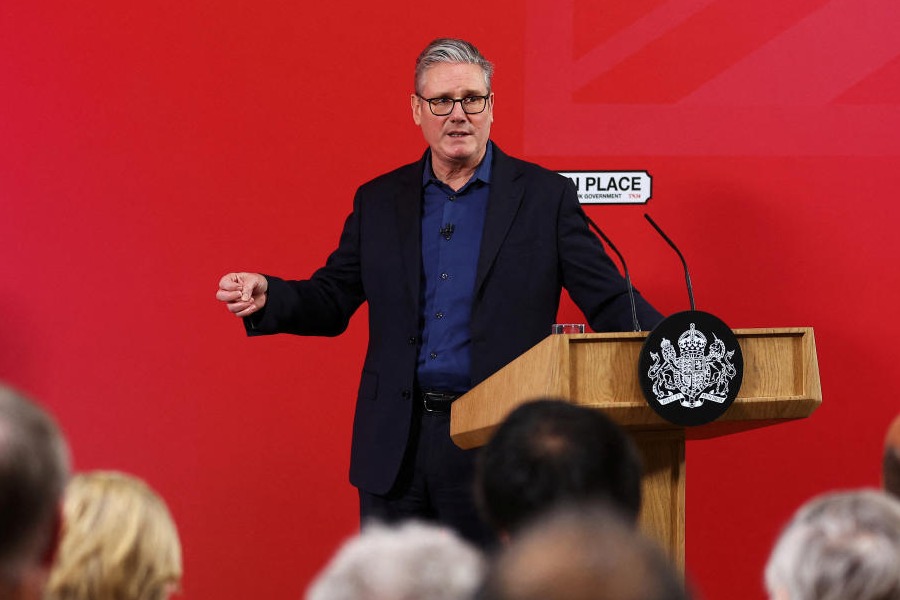Mumbai, April 18: Tata Consultancy Services, India's biggest software services exporter, reported a smaller-than-expected rise in fourth-quarter earnings on Tuesday, but was confident of demand growth in some of its major focus areas.
TCS, part of the Tata group - India's largest conglomerate, expects a robust pipeline of projects in automation and cloud services, chief operating officer N. Ganapathy Subramaniam said after the earnings release.
The results come as India's more than $150-billion software services sector faces uncertainties over visa rules in its biggest market, the United States.
US President Donald Trump is expected to sign an executive order on Tuesday directing federal agencies to recommend changes to the H-1B visa programme.
"We are competitive and as long as the regimes are broadly equal for everyone we don't see our relative competitiveness actually going down," said chief executive Rajesh Gopinathan, who took over the top job in February from N. Chandrasekaran (now chairman of Tata Sons).
Quarterly results
TCS's consolidated net profit rose 4.2 per cent to of Rs 6,608 crore in the three months to March 31, from Rs 6,340 crore in the year-ago period.
Analysts had, on average, expected a consolidated profit of Rs 6,650 crore.
TCS, which reported its first quarterly earnings under CEO Gopinathan, said revenue rose 4.2 per cent year-on-year to Rs 29,642 crore.
On a sequential basis, the bottomline showed a drop of 2.50 per cent.
TCS, like its peers, has been passing through challenging times because of tepid conditions in the BFSI (banking, financial services & insurance) space, the appreciating rupee which has impacted margins apart from policies announced by the Trump administration.

Speaking to reporters today, Gopinathan said TCS posted a strong set of financials in a relatively seasonally weak quarter. He pointed out that the firm witnessed growth across all fast growing segments, barring BFSI and retail, which saw negative growth. He added that if these two sectors were to be excluded, TCS would have posted a 3.4 per cent revenue growth in constant currency terms.
While BFSI witnessed a 0.4 per cent decline, the retail segment, which is facing structural challenges, saw a contraction of 0.3 per cent.
Gopinathan, however, exuded confidence that the BFSI segment, which is the largest contributor (in domain terms) to TCS revenues, will bounce back in the current year.
"We are seeing a lot in the pipeline for strong projects, the deal momentum is high, but project size is smaller. This is translating into volatility in the quarter-on-quarter numbers. When we met customers, all were positive about the future (for BFSI) and they have strong investment agenda... BFSI is not a structural problem. It's only a question of how volumes build up over time,'' he observed.
The TCS CEO pointed out that after he took over, he spent his first two months visiting customers across North America and Europe. The common theme among them was the strong focus on digital, apart from operational efficiency which are TCS strengths.
"We see 2017-18 as incrementally positive," he said.
During the quarter, revenues came in at Rs 29,642 crore, which marked a decline of 0.3 per cent sequentially and a growth of 4.2 per cent over the same period of last year. The dollar revenues were at $4452 million, a growth of 1.5 per cent over the preceding quarter.
"The last fiscal was a year of broad-based growth amidst economic and political turbulence in our key markets. We added $1.4 billion in constant currency revenues during the year and increased our digital revenues sharply as we helped our customers leverage the digital economy.
"Our digital business grew at 29 per cent annually with most industries showing double digit growth as we steadily increased the number of customers across different revenue bands," he said.
"On the back of digital adoption, 'agile, automation and cloud' are the themes that we are going to market to drive efficiencies and predictable outcomes across our clients infrastructure, applications and business operations,'' Gopinathan said.










